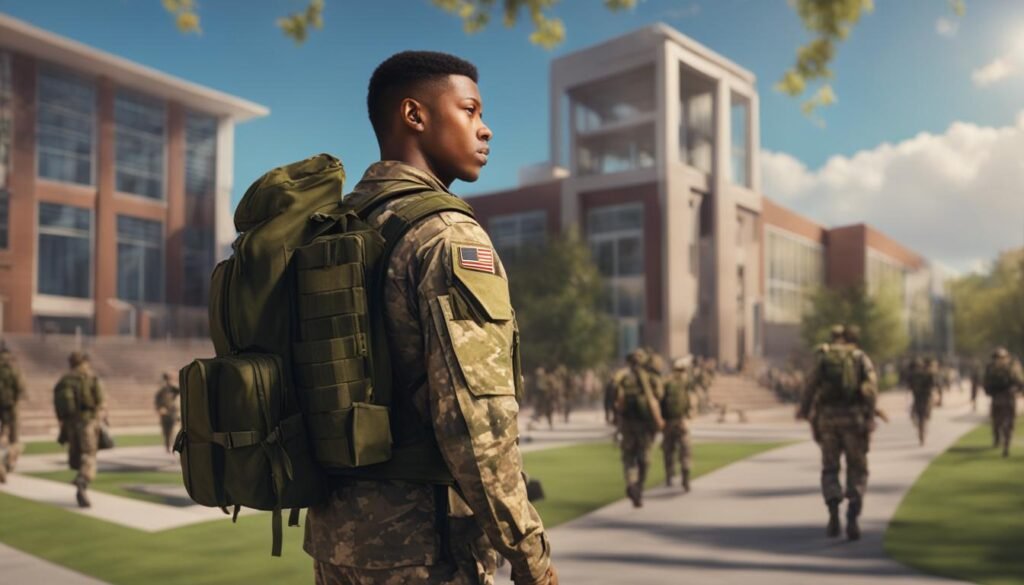The transition from military service to college can be a challenging and transformative experience. With the support of programs like the Post-9/11 GI Bill® and organizations dedicated to assisting veterans, more than 1.7 million military veterans have been able to access higher education. However, veterans may face unique challenges and may need to seek support for academic, social, and mental health needs. Overcoming the stigma of seeking support is important, and veterans can utilize resources provided by colleges, veteran’s groups, and student-run organizations to navigate this transition successfully.
Key Takeaways:
- Transitioning from military service to college can be challenging and transformative.
- Veterans may face unique challenges and should seek support for academic, social, and mental health needs.
- Overcoming the stigma of seeking support is important.
- Colleges, veteran’s groups, and student-run organizations offer resources to assist veterans in their transition.
- Utilizing available resources can help veterans navigate the college admission process successfully.
Tips for Transitioning from Military to College: Overcoming Challenges and Finding Support

Transitioning from military service to college can present unique challenges. However, with the right support and resources, veterans can navigate this transition successfully and thrive in their academic pursuits. Here are some valuable tips to help you on your journey:
1. Seek Support and Overcome Stigma
Many veterans face stigma and resistance when seeking support. It’s important to remember that asking for help is not a sign of weakness but a necessary step towards success. Recognize that colleges, communities, and the military provide various resources to assist veterans in managing academic challenges, cultural adjustments, medical conditions, mental health concerns, and substance abuse issues. Take advantage of programs like Real Warriors and Student Veterans of America, which aim to remove the stigma surrounding mental health challenges and provide support for veterans.
2. Proactively Manage Challenges
Take proactive steps to manage daily challenges by utilizing the support services available to you. Seek academic counseling, tutoring, and mental health support both on campus and through the Department of Veterans Affairs. Connecting with fellow veterans who understand your experiences can provide a valuable support network and a sense of camaraderie. Student organizations like the Student Veterans of America offer opportunities to connect with other veterans and build a community on campus.
3. Adapt Learning Strategies and Find the Right Environment
Transitioning from military service to college may require adapting your learning strategies. Programs like the Warrior-Scholar Project and the National Association of Veterans Upward Bound offer workshops and support to help veterans leverage their leadership and problem-solving abilities in an academic setting. Take advantage of campus resources such as academic counselors, tutoring services, and study groups to enhance your academic success. Consider visiting potential college campuses and exploring online courses to find the right environment that suits your needs.
Remember, transitioning from military to college is a journey that may come with its challenges. However, by seeking support, managing challenges proactively, and adapting your learning strategies, you can overcome obstacles and thrive in your college experience. Stay resilient, utilize available resources, and build a network of support to make the most of this exciting new chapter in your life.
Military veterans often face college adjustment challenges for former military when transitioning to college life. To ease the process, veterans can seek out support services specifically tailored to their needs, such as academic counseling, VA benefits information, and veteran peer support groups. These resources can provide invaluable assistance during this significant life change.
Strategies for Academic Success and Building Community
As a veteran transitioning to college, there are strategies you can adopt to ensure your academic success and build a supportive community around you. Adapting your learning strategies from military service to college can be challenging, but there are resources available to assist you.
Consider participating in programs like the Warrior-Scholar Project and the National Association of Veterans Upward Bound. These workshops provide valuable support, helping you leverage your leadership and problem-solving abilities in an academic setting.
Don’t hesitate to seek academic help from campus resources, such as academic counselors, tutoring services, and study groups. They can provide guidance, assistance, and additional learning opportunities that contribute to your success as a student.
Building a community of fellow veterans can also be immensely beneficial. Connect with other veterans on campus through student organizations like the Student Veterans of America. If there isn’t a chapter at your college, consider starting one to create a support network and foster a sense of camaraderie among veterans.
When exploring potential college campuses, take the time to visit and evaluate if it aligns with your needs. Additionally, consider taking online courses, which offer flexibility and can be a helpful alternative or addition to on-campus classes.
By utilizing available resources, adopting effective learning strategies, and finding a community that understands your experiences, you can navigate the college admission process with confidence and thrive in an academic setting.



